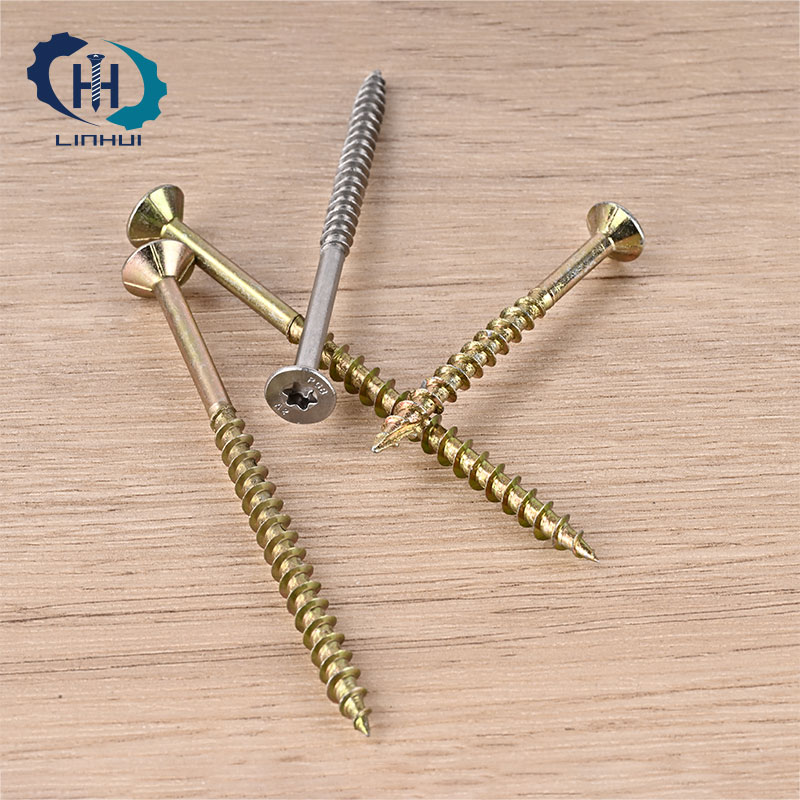The Importance of Wood Working Screws in Carpentry and Furniture Making
2025-04-09
Woodworking is an art that has been practiced for centuries, and it continues to be a crucial part of many industries today. From furniture making to building structures, the tools and materials used in woodworking play a pivotal role in the quality and durability of the finished product. One of the most essential materials in woodworking is the humble screw. Woodworking screws are designed specifically for use in wood, and they offer significant advantages in terms of strength, reliability, and ease of use. Whether you're a professional carpenter or a DIY enthusiast, understanding the importance of woodworking screws can help you achieve better results in your projects.
What Are Wood Working Screws?
Woodworking screws are specially designed screws made to fasten wood pieces together securely. Unlike general-purpose screws, these screws have features that make them ideal for use with wood, such as deeper threads, sharper points, and wider heads. These features allow the screw to hold tightly in wood without causing it to split or weaken.
Woodworking screws come in various sizes, lengths, and materials, allowing them to be selected based on the specific needs of a project. Some common types of wood screws include flat head screws, round head screws, and counter-sunk screws. Each of these types has unique characteristics that are suited for different woodworking tasks.
Why Choose Wood Working Screws?
1. Strength and Durability: One of the main advantages of woodworking screws is their ability to create strong and long-lasting joints. The deep threads and sharp points of these screws allow them to grip the wood securely, providing a strong bond that can withstand heavy loads. Whether you're building a bookshelf, assembling a wooden chair, or constructing a wooden deck, woodworking screws ensure that the parts stay firmly together over time.
2. Prevents Splitting: Woodworking screws are designed with features that prevent the wood from splitting. The sharp point and threads allow the screw to enter the wood smoothly, without putting unnecessary stress on the material. This is particularly important when working with softer woods like pine or when attaching small pieces of wood that could easily split under the pressure of a regular screw.
3. Ease of Use: Unlike nails or other fasteners, woodworking screws are easy to install and remove. Their threaded design makes them easy to drive into wood with a drill or screwdriver. Additionally, if you need to make adjustments or repairs to your project, screws can be easily removed and replaced without damaging the wood. This makes woodworking screws a more versatile option compared to other fastening methods.
4. Variety of Designs: Woodworking screws come in a range of designs to suit different applications. For example, flat head screws are commonly used for flush-fitting joints, while round head screws are often used when a raised head is desired. Additionally, screws with countersunk heads allow the screw to sit flush with the surface of the wood, providing a cleaner, more professional appearance.
5. Corrosion Resistance: Many woodworking screws are made from materials that resist corrosion, such as stainless steel, zinc-plated steel, or brass. This is especially important for outdoor woodworking projects, such as building a deck or garden furniture, where exposure to the elements can cause rust and deterioration. Choosing corrosion-resistant screws ensures that your project remains intact and visually appealing for years to come.
Applications of Wood Working Screws
Woodworking screws are used in a wide variety of applications, from small DIY projects to large-scale construction. Here are a few examples of where they are commonly used:
1. Furniture Making: Woodworking screws are essential in the construction of furniture such as tables, chairs, and cabinets. The screws provide a sturdy connection between the different parts, ensuring the furniture remains stable and durable over time.
2. Cabinetry: When installing or assembling kitchen cabinets, bookshelves, or other wooden fixtures, woodworking screws are used to secure the pieces together. Their strong hold ensures that cabinets can bear the weight of items stored inside without coming apart.
3. Decking and Outdoor Projects: For outdoor projects like building decks, pergolas, or garden furniture, woodworking screws offer the necessary strength and durability to withstand the harsh elements. The corrosion-resistant screws ensure that the structures stay secure and in good condition, even after exposure to moisture, rain, and sun.
4. Wooden Fences and Sheds: Whether you're building a fence, a shed, or a wooden gate, woodworking screws provide the strong and lasting bond needed to keep the structure stable. Their ability to resist rust and corrosion makes them ideal for outdoor use in these applications.
5. DIY Projects: For hobbyists and DIY enthusiasts, woodworking screws are the go-to fastener for a wide range of craft projects, from creating wooden toys to building custom shelving units. Their ease of use and reliable performance make them a popular choice for individuals working on home improvement projects.
Tips for Choosing the Right Wood Working Screw
When selecting the right woodworking screw for your project, several factors should be considered to ensure you get the best results. Here are a few tips to help you make the right choice:
1. Material: Choose screws made from materials that are appropriate for the type of wood you are working with. For example, stainless steel screws are ideal for outdoor projects because they resist corrosion, while brass screws are often used for decorative purposes due to their aesthetic appeal.
2. Length and Size: The length and size of the screw should match the thickness of the wood you're working with. A screw that is too long may protrude from the wood, while a screw that is too short will not provide a secure hold. When in doubt, it's better to choose a slightly longer screw, as it can always be trimmed or countersunk to fit.
3. Thread Type: The type of thread on the screw can affect how well it holds in the wood. Coarse-threaded screws are ideal for softwoods, while fine-threaded screws are better for hardwoods. Consider the type of wood you are working with to ensure the best grip.
4. Head Style: Select the appropriate head style for your project. Flat-head screws are perfect for flush connections, while round-head screws are ideal when you need a raised profile. If you want a clean, professional finish, choose screws with a countersunk head.
5. Pilot Holes: Before driving in screws, it’s often recommended to drill pilot holes, especially in hardwoods, to prevent splitting. Pilot holes should be slightly smaller than the diameter of the screw, allowing it to bite into the wood while still leaving room for the threads to grip securely.
Conclusion
Woodworking screws are a crucial component in any carpentry or woodworking project. With their ability to create strong, durable, and precise joints, they provide the reliability needed to ensure that wooden structures remain intact over time. Whether you're building furniture, constructing outdoor decks, or tackling a DIY project, choosing the right woodworking screws will make your job easier and more efficient. By understanding the different types of screws and their applications, you can achieve professional-quality results every time.



